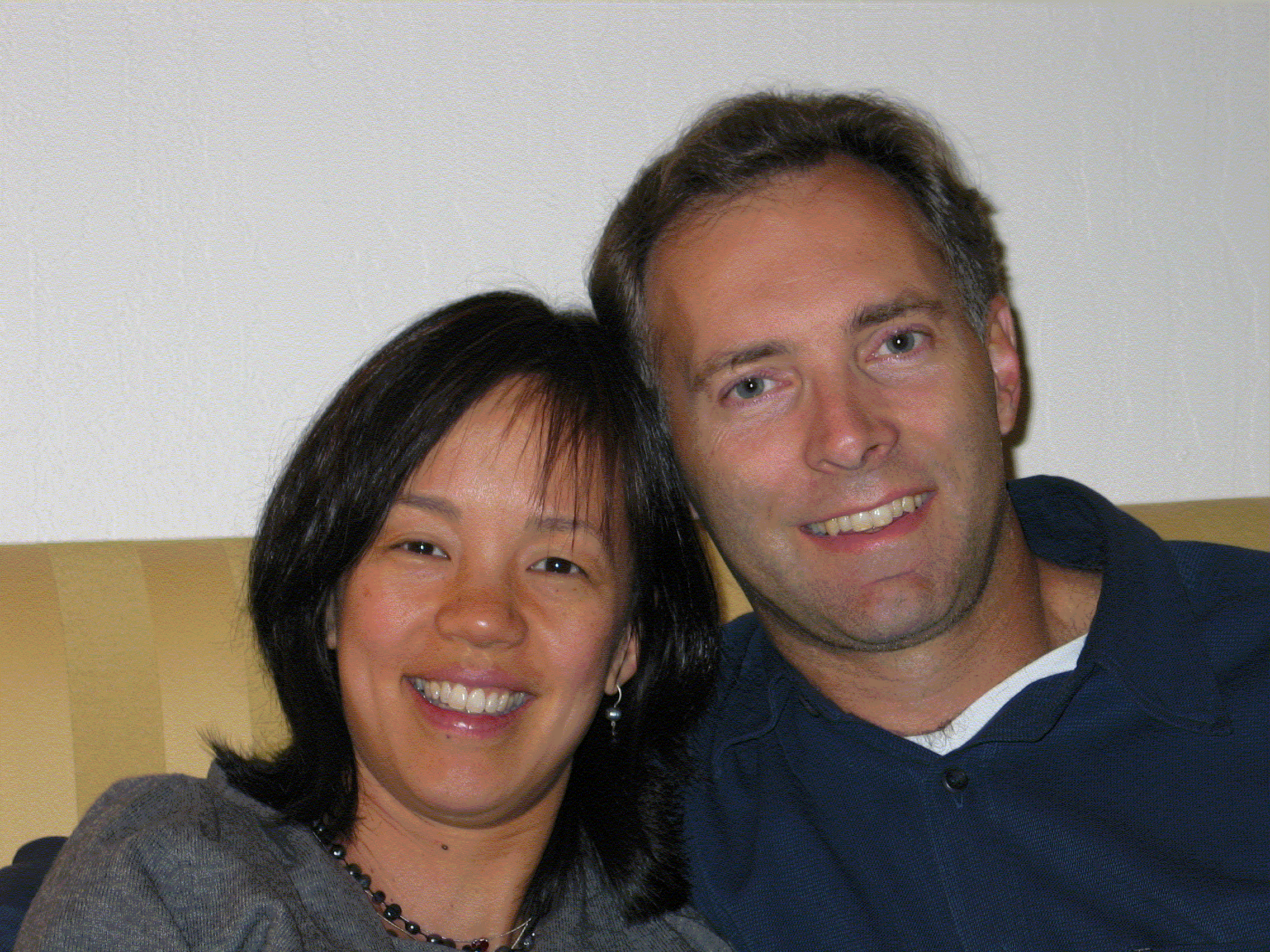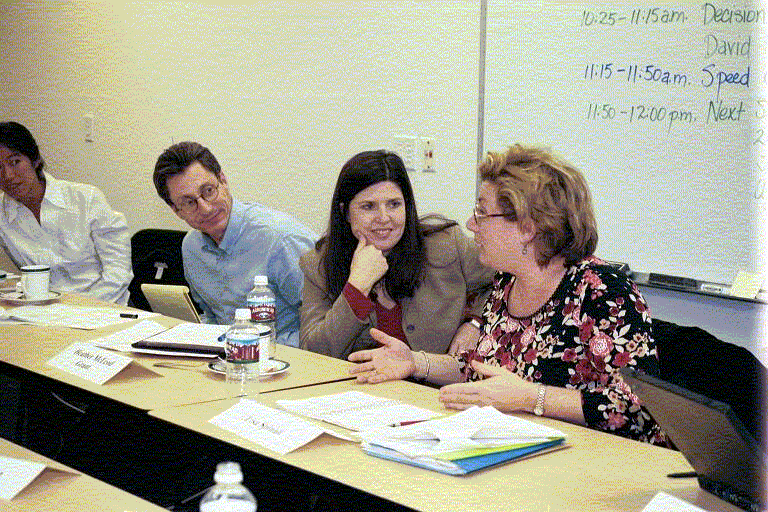
TFI UPDATE
Spring 2003
Inside this issue:
- From the President
- TFI Affiliate Spotlight: Orsak Family Foundation
- Upcoming Programs
- Learning Exchanges
- Special Deals for New Members
- Capacity Building Venture Fund
- TFI Partners with Rockefeller Philanthropy Advisors
- Members Only Web Page Launched
Mapping the Way
Though the economy has taken a significant toll
on the grantmaking budgets of mature foundations, and new foundations
are delaying their start-ups or beginning with less than originally planned,
participation in The Foundation Incubator has been building.
Our membership has grown to 36 Affiliates and new interest emerges every
day around the Bay Area. That’s because philanthropists want to hear how
others are navigating in these lean times, how they are modifying their
plans, becoming more targeted in their grantmaking and more creative in
staffing. Unfortunately, there’s no guidebook for new foundations on how
to get started. Even established foundations have few opportunities to
study in-depth topics with peers in a structured setting. At some point,
most people doing philanthropic work feel isolated and are vividly aware
of how little time they have to regularly convene with colleagues.
The Foundation Incubator fills these gaps. TFI is a dynamic, engaged community
that connects you with your peers to discuss an array of innovative practices
and approaches. As Tony Hoeber, Executive Director of the Dalai Lama Foundation
describes it, “At TFI you access a network of amazing philanthropists.”
TFI offers a rich menu of workshops, roundtables, discussion groups, coaching
and mentoring opportunities.
Recognizing the reality of our current economy, the Incubator has reduced
its membership fees and is launching introductory membership packages,
including a six-month trial membership for young foundations. If you are
just starting out, or if you don’t yet have a foundation or a giving vehicle,
our six-session series, “Nuts and Bolts,” will help you make the right
choices and accelerate your start-up. Also this spring, TFI launches a
collaborative grantmaking venture fund. This is just one more tool members
can use to learn the ins and outs of establishing and participating in
funding cooperatives.
Simply stated, TFI was established because there is no readily identifiable
path to guide philanthropists’ way. But by putting impassioned, creative
minds together, we are creating a road map.
Elizabeth L. Bremner, President
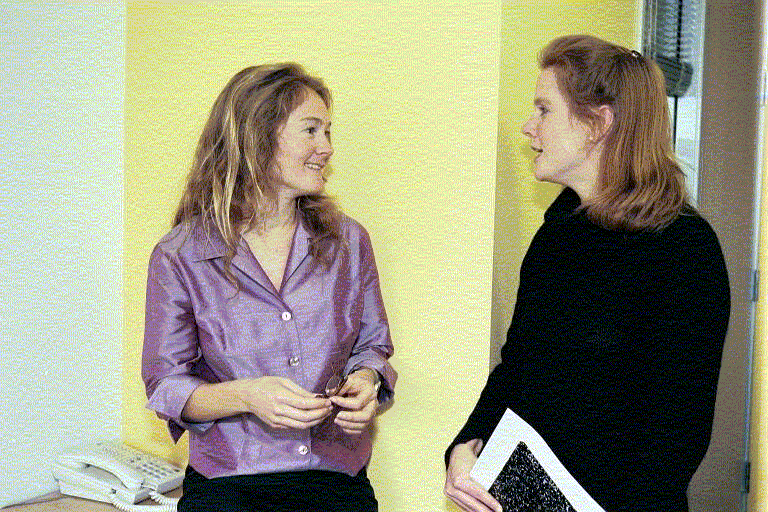
From left to right: Affiliate members Haley Mitchell, Full Circle Fund and Christy Chin, Skoll Foundation.
Back to Top
TFI Affiliate Spotlight: Shirley Chu Orsak and Mike Orsak
A few years ago, Shirley Chu Orsak took a break from a career as a marketing executive for high-tech companies to raise two daughters, while her husband, Mike, continued his work as a venture capitalist. Recently, the couple decided it was time to devote some of their energy to giving back.
In addition to a donor advised fund at the Community Foundation of Silicon Valley, the Orsaks created their own informal giving program that focuses on issues of personal interest – youth leadership and cancer research and treatment.
“We’re mostly funding emerging, innovative programs that we think are going to be impactful,” Shirley Orsak says. “We’re interested in collaboration and projects that can be piloted. And it’s not just a financial commitment – we also want to commit our time and intellects.” Among other projects, the Orsaks are supporting certified educators who are dedicated to teaching leadership skills and promoting student leaders.
Initially, Orsak says, she was concerned about how she and her husband would manage the myriad tasks and decisions required of philanthropists. She was afraid that they would have trouble agreeing on priorities and that, with two young children and a busy life, they would not be able to dedicate sufficient time to the effort.
But as it turned out, her fears were unfounded. “We have agreed on far more things than I would have imagined. We’ve created strategies where one person takes the lead on a given project. Each of us comes up with ideas and we bounce those ideas off each other. It seems to work well. We share similar values around giving. If anything, we wish we had more money to give.”
Around the time that the Orsaks were establishing their philanthropic program, The Foundation Incubator was launched. The couple attended TFI’s opening and became early members, believing that TFI would directly address their needs.
“I went to monthly learning exchanges,” she recalls. “They were so helpful in teaching Mike and I, as new donors, the simple ABCs. The staff and members are very strong and very smart. We come from the business world and the way things are run in nonprofits is different.”
TFI staff consulted with the Orsaks in one-on-one coaching sessions on evaluating their first grant proposal, received from a doctor at a New York City hospital. Shirley was paired with a mentor who had years of experience in philanthropy and in implementing innovative cancer initiatives. TFI staff invited her to speak at a conference, where she met people she says will be enormously helpful in the future. Most of all, Orsak says, the Incubator has proved to be a great forum for collaboration and networking.
“For Mike and me, this is not a full-time job. TFI has been invaluable in getting us up to speed in a short amount of time.”
Back to Top
From left to right: Affiliate members Shirley Chu Orsak and Mike Orsak.
Upcoming Programs

Linda Verhulp, Morgan Family Foundation.
Back
to Top
Learning Exchanges
A Source of Inspiration, Validation and Support
One of the signature features of The Foundation Incubator, monthly learning
exchanges bring a group of grantmakers together to discuss issues and
trends in philanthropy, serve as resources for one another in solving
day-to-day implementation challenges and share operational and grantmaking
practices that each is developing.
Over the year that a learning exchange meets, relationships deepen and
a community develops. “You begin to see people enthusiastically greeting
their learning exchange colleagues at conferences and philanthropy events,
letting people know about great articles they have come across, making
referrals to potential consultants and collaborating on joint grantmaking
ventures,” observes Eleanor Clement Glass, TFI’s Vice President.
It was at her learning exchange that Joyce House, of the Dave House Foundation,
decided to switch to grant summaries instead of forwarding entire proposals
to each trustee. David Keller, of the David and Anita Keller Foundation,
shared a decision-making tool that he uses to identify the highest leverage
grants to support. Christy Chin, of the Skoll Foundation, inspired others
with a report that the Skoll Foundation trustees had just adopted a policy
to spend more in down times to support the nonprofit community’s need
and pay out less during boom times.
Topical discussions have included building an effective and engaged board
of directors, defining social change philanthropy and the values we bring
to philanthropy and how they can be manifested. Learning exchange discussions
advantageously build on other TFI workshops and events.
Individual grants are also shared. For example, Roberta Katz told her
group about a grant that combined her husband Chuck’s interest in environmental
issues and her passion for education. When Haley Mitchell told the group
about an affordable housing advocacy grant made by Full Circle Fund, she
sparked a dialogue about the levels of impact each member was seeking
and how funder and community goals can be attained.
TFI learning exchanges are a meeting place for diverse organizations and
individuals. Often, the microcosm of philanthropy is represented in a
group of 10-15 organizations – a small, family foundation in which the
participant manages dual roles of trustee and executive staff to a member
of a high engagement/venture philanthropy collective such as Social Venture
Partners-Bay Area, Full Circle Fund or SV2. Corporate philanthropy staff
sit at the table with community foundation staff; trustees with program
officers. Newcomers are introduced to philanthropy and experienced grantmakers
meet potential partners and learn about innovations that are taking place
in the field.
This diversity prompts complex dialogue and expands the focus from how
philanthropy is accomplished to discussions about how it might be accomplished.
Learning exchanges are confidential – a safe space to talk about real-time
challenges and push thinking as policies and procedures are codified and
grantmaking practices are explored and debated. They are a place where
you and your work are understood, where other people support and validate
your progress.
Initially designed by volunteer Christine Johnson and Eleanor Clement
Glass, TFI learning exchanges are facilitated to create a highly interactive
peer learning community. Participation eliminates the isolation that is
often felt in philanthropic work, jump-starts networks and provides ongoing
opportunities for active reflection on ideas and practices with supportive
colleagues.
Back to Top
From left to right: Affiliate members Georgette Wong, Full Circle Fund; Tony Hoeber, The Dalai Lama Foundation; Heather McLeod Grant, Saga Leadership Fund; and Lisa Spinali, Omidyar Foundation at a Learning Exchange session.
Special Deals for New Members
If you’ve considered joining TFI’s vibrant community, there isn’t a better opportunity than now. For the first time, the Incubator is offering introductory packages for new members at significantly reduced rates.
Friends of TFI. As an honored
friend of TFI, enjoy full membership privileges for one year at a reduced
rate, calculated on a sliding scale. Receive invitations to members-only
events, workshops and briefings and participate in ongoing learning exchanges
with peers, collaborative grantmaking projects, coaching and mentoring.
Share our attractive meeting rooms.
Trial Package for New Foundations. This package offers a sampling
of TFI’s activities for a six-month period at a discounted rate of $499.
Foundations that are less than three years old with less than $50 million
in assets can take part in our series of nuts-and-bolts workshops on the
basics of grantmaking and foundation operations, a one-on-one coaching
session, monthly peer group meetings and referrals to professionals in
the field. We encourage you to act quickly – space is limited. Please
contact us for further information:
Affiliate member David Keller,
David and Anita Keller Foundation, at a Learning Exchange session. Back to Top
If you would like more information
about The Foundation Incubator:
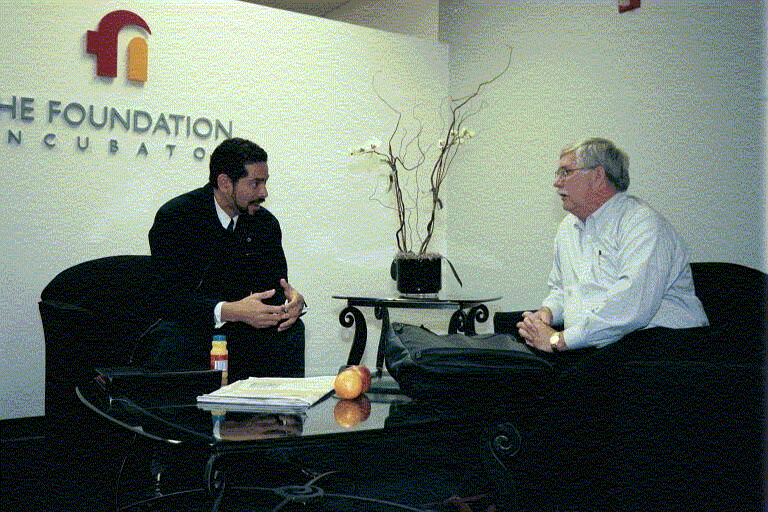
Michael Patterson and Garfield Byrd, Community Foundation Silicon Valley
Back to Top
Capacity-Building Venture Fund
On March 20, The Foundation Incubator launched the Capacity-Building
Venture Fund, a pooled grantmaking fund designed to improve the
organizational effectiveness of nonprofit organizations through
capacity building grants.
As a learn-by-doing professional development activity of TFI,
the Venture Fund allows TFI Affiliate Members a chance to organize
a collaborative funding pool, jointly develop criteria for grant
selection and make collective decisions about the distribution of grants.
Participants will be asked to contribute to the fund and their dollars
will be matched with a grant of up to $50,000 from the David and Lucile
Packard Foundation. The goal is to raise and distribute at least
$100,000 to a minimum of 10 organizations by July 15.
Eleanor Clement Glass will facilitate the Venture Fund program. “This fund
allows grantmakers to leverage their dollars and shape the funding criteria
that is important to them,” Clement Glass notes. “It’s also a great way
to find future funding partners.
For information,
contact eleanor@foundationincubator.org
or phone 650.354.1605.
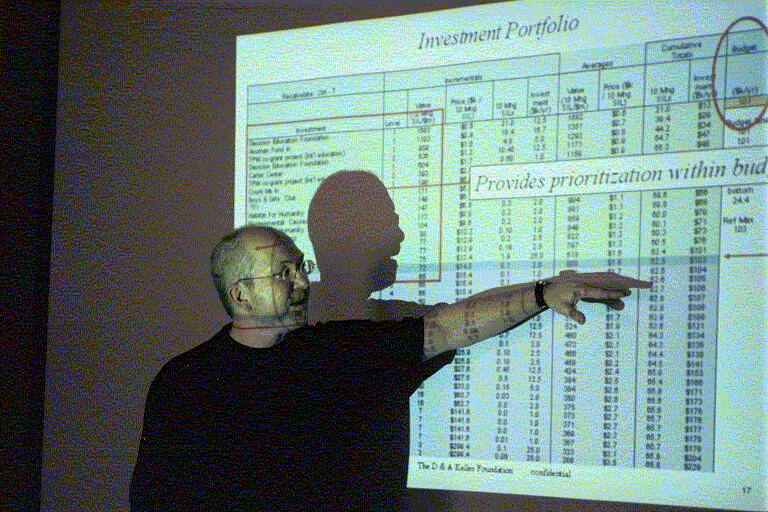
TFI Partners with Rockefeller Philanthropy Advisors
In March, The Foundation Incubator and Rockefeller
Philanthropy Advisors formed a unique alliance that will provide philanthropists
with a deeper and broader range of services and participatory learning opportunities
that will help maximize the impact of their gifts.
Rockefeller Philanthropy Advisors (RPA) is an independent,
nonprofit service that works in the areas of foundation planning,
grantmaking and program management. In the past decade, RPA has
advised on and managed more than $850 million in giving to 40 countries.
“The synergy of this relationship is very exciting,” says Liz Bremner,
TFI’s President. “By pairing our proven incubator approach with RPA’s
track record of excellence, we can offer donors a resource of
unparalleled breadth and depth.”
“Rockefeller Philanthropy Advisors has long admired
The Foundation Incubator’s groundbreaking concept,” says
Melissa A. Berman, RPA’s President and CEO. “We’re proud to
be involved in a partnership that has the potential to shape
the future of giving not just in the United States, but also
the world.” In addition to collaborating on services to individual
donors, TFI and RPA will cosponsor donor education programs, work
to increase awareness of international giving opportunities and
support the needs of emerging philanthropists.
Members Only Web Page Launched
The section is entered with a user name and password. Members who have not
yet received their personal access information should contact Annedore Kushner
at annedore@foundationincubator.org or 650.354.1604.
If you’re not an Incubator member, please join us! Whether you are just
getting started or have years of expertise, whether you are seeking an end
to isolation or opportunities to share knowledge and drive innovation, as
a member of TFI you’ll be part of a dynamic community where new ideas, applications
and alliances are born.
Take advantage of our newly announced introductory membership packages,
described in this Update.
Send us an email at:
info@foundationincubator.org
Call us:
(650) 354-1600
Or, visit us:
The Foundation Incubator
1804 Embarcadero Road, Suite 200
Palo Alto, CA 94303
www.foundationincubator.org
Back to Top
